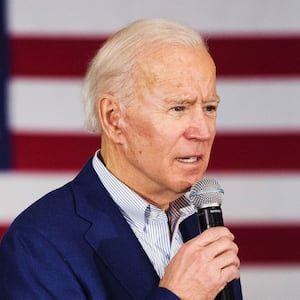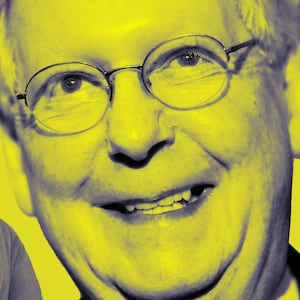Stacey Abrams is lobbying hard to be Joe Biden’s presidential running mate, and she brings to the table an asset few other contenders do: an extensive, battle-hardened organizing apparatus that she can bring to bear on behalf of the Democratic presidential ticket in November.
But with that asset comes a liability. The extensive work done on Abrams’ behalf by a network of political and nonprofit groups that she founded has raised persistent questions about her use of ostensibly apolitical voter-registration and canvassing outfits to boost her own political profile.
The advocacy work and more nonpartisan activities of Abrams’ network of nonprofits take place parallel to each other, as required by her groups’ varying legal classifications. But their work also bleeds together in notable ways. Her political outfit and its sister dark-money nonprofit share a website and social-media pages, for instance. They also lean heavily on the same cadre of organizations to execute their missions. A Daily Beast analysis of public records shows that two of Abrams’ groups, a tax-exempt voter-registration organization and a more aggressive advocacy group, have steered millions of dollars to the same political consultants that helped elect Abrams to the Georgia statehouse and tried to win her the governorship in 2018.
The data portray an organizing apparatus that is primed to advance Abrams’ political prospects in 2020 regardless of the form they take, but which could force her—and, if she gets her wish, presumptive Democratic presidential nominee Joe Biden—to address questions, albeit many posed by political adversaries, about her use of groups legally bound to remain legally independent and politically neutral.
They’re largely questions that Abrams and some of her top allies write off as baseless attacks from political opponents.
“The organizations founded by Leader Abrams give a voice to marginalized communities and empower people of color and low-income Americans across the country,” her spokesperson, Seth Bringman, told The Daily Beast in an emailed statement. “This critical work has been the target of allies of [Georgia Gov.] Brian Kemp and Donald Trump, because they are desperate to hold on to their power, and they know they can only maintain their power if voters and people in this country are not counted. She will not be deterred from her critical work by fishing expeditions and made-up accusations from Kemp and Trump cronies.”

If Joe Biden taps Stacey Abrams as his running mate, they’ll both face questions about the use of nonprofit organizations to boost her political profile.
Curtis Compton/Atlanta Journal-Constitution/TNS/ABACAPublicly and privately, Democrats frequently point to Abrams’ organizational prowess as the leading reason that she would be a formidable vice-presidential nominee for Biden. The Georgia Democrat, the thinking goes among some of her closest allies, Democratic Party strategists, and some within Biden’s own campaign, would fill in key gaps that the presumptive nominee lacks, particularly with younger voters. Abrams is also considered to be someone who can turn out black voters at a large scale for the general election, a key argument used among some in the party who believe that’s the best approach to beating President Donald Trump.
“When Stacey ran for governor, she mobilized hundreds of thousands of African-American and younger voters to vote for her. That shows just the personal appeal of her and how strong she is with turnout,” Freg Yang, Abrams’ pollster during the 2018 governor race, told The Daily Beast.
“More than a year ago, she knew turnout was going to be important in 2020, based on her own experience in 2018. It makes her even more relevant now given all this uncertainty.”
Nikema Williams, the head of the Georgia Democratic Party, said Abrams and her organizational structure transcend racial, geographic, and socio-economic lines, and can help boost turnout more broadly. “If you speak with progressives, they think she’s the most progressive person ever because she connects with them,” Williams said. “And if you speak with people that are moderate, they’re able to connect with her because she speaks their language as well.”
When Biden pledged to nominate a female Democrat to be his running mate in March, Abrams again shot to the top of many elected officials’ and operatives’ lists. At least two high-ranking officials in Biden’s campaign have been praising Abrams internally as recently as last month, before her public push for VP ramped up in earnest. Her core draw, in that instance, was a sense that she, and the network she’s built, have a broad reach well beyond her home state.
But Abrams’ network has also faced allegations that it exists primarily to advance her public profile and political agenda. In 2019, the Foundation for Accountability and Civic Trust, a right-leaning watchdog group, filed a complaint to the Internal Revenue Service alleging illicit politicking by Fair Fight Action, a dark-money nonprofit group that Abrams leads.
“By providing support for an individual’s personal political activities,” FACT wrote in its IRS complaint, “Fair Fight Action is in violation of the requirement that a social-welfare organization serve general community purposes rather than provide a private benefit to an individual or political group.”
The group wrote off the complaint at the time as a “bogus attack” from “right-wing hit groups allied with Donald Trump.”
Similar allegations are at the heart of an investigation by the Georgia Ethics Commission into the activities of another Abrams-founded nonprofit, the New Georgia Project Action Fund, during the 2018 campaign. David Emadi, the commission’s executive director and an appointee of Gov. Kemp, Abrams’ Republican opponent in 2018, suggested that New Georgia may have illicitly acted as a political committee on Abrams’ behalf, an allegation that Abrams and her team have flatly denied.
Neither the FACT complaint nor the investigation in Georgia have resulted in findings of wrongdoing by any Abrams group, though the ethics commission said last week that its investigation was still ongoing. As it did with FACT, Abrams’ team has largely written it off as politically motivated.
After Abrams’ 2018 defeat, she alleged that Kemp, Georgia’s former secretary of state, used his position to suppress votes that might have swayed the election. After Abrams conceded in mid-November, her campaign donated more than $1 million in leftover funds to Fair Fight Action, which continued litigation and advocacy efforts to address those voter suppression allegations. The group did so under the new leadership of Abrams’ former campaign manager.

After Stacey Abrams conceded to Brian Kemp in mid-November, her campaign donated more than $1 million in leftover funds to Fair Fight Action.
John Bazemore/GettyAt the time, Fair Fight Action was still officially called the Voter Access Institute. But it amended its corporate structure on Dec. 5, 2018, to reflect its new moniker. It also made a significant change to the group’s corporate bylaws: It deleted language saying it would not get involved, “directly or indirectly,” in political contests.
Just days later, Fair Fight Action began running television ads. And it did so through the same media buyer, Chicago-based AL Media, that the Abrams campaign had been using just weeks earlier. Campaign-finance records show the Abrams campaign had already paid the firm more than $4.7 million. By the end of 2018, Fair Fight Action had steered it an additional $165,000.
Federal Communications Commission records show that the same AL Media employee handled media buys for both the nonprofit and the campaign.
More recent FCC filings show that AL Media continues to buy ads for Fair Fight Action. So far this year, the group has purchased about $155,000 in broadcast ad time, according to data compiled by the Center for Responsive Politics, for a pair of ads going after Kemp, whom Abrams has pondered challenging in 2022. AL Media is simultaneously handling ad buys for Fair Count, Abrams’ 501(c)(3) charitable group.
There’s nothing legally problematic with that relationship; such vendors often work for both political entities and nonprofit and advocacy groups, and are free to do so as long as the proper firewalls are in place to ensure that work remains separate. But it underscores how complementary the electoral and apolitical nodes of Abrams’ network are.
Since 2014, Fair Fight Action has paid more than $2 million to five different vendors that also worked for Abrams’ campaign or Georgia Next, her state-level political action committee, including fundraising firm G Strategies, phone-banking vendor Control Point Group, and direct-mail firm Deliver Strategies.
During the same time period, Fair Count paid G Strategies for fundraising services as well. In 2014 and 2015, Fair Count and Fair Fight Action paid more than $2.7 million combined to a voter contact and communications firm called Field Strategies. In 2017, a partner at that firm, founded a new consulting firm called New Ground Strategies, which received more than $5.5 million from Abrams’ gubernatorial campaign. According to its website, New Ground has worked for years with the New Georgia Project, which Abrams founded and led prior to her gubernatorial run.
All told, Abrams’ 2018 gubernatorial campaign, her past statehouse campaigns, and Georgia Next paid more than $14.7 million to political vendors that have also worked for one or more of Abrams’ nonprofit groups.
Even among the nonprofit groups themselves, that division of labor can be difficult to distinguish. Fair Fight Action, for instance, shares a website and a Facebook page with Fair Fight, Abrams’ PAC. Both advise that the web properties are joint projects of the PAC and the dark-money group, a rare move for organizations with different legal structures—and different limits on how explicitly political their work can be.
The website’s donation link directs visitors to the PAC’s contribution page. The PAC, in turn, passes along funds to the dark-money group. It’s provided about $1.8 million in contributions to Fair Fight Action since last year, and paid it another $2 million in reimbursements for shared overhead and expense
None of that is inherently problematic from a legal perspective. But the common thread among all parties—the political action committees, the nonprofits, and their vendors—is a drive to promote Abrams, the woman whose drive to enfranchise and turn out communities of color have animated their work for years.
Abrams, in turn, is front and center as they carry out that work. Since December, Fair Fight Action has paid tens of thousands of dollars to run scores of Facebook ads promoting its voter registration and turnout activities. Every one of the ads has featured a photo or a video of Abrams herself.




